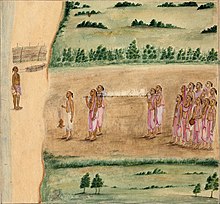Cremation
Appearance




Cremation involves the combustion or burning of cadavers into ashes, an environmentally sound and frugal alternative to traditional burial.
Quotes
[edit]- It is a fortunate and happy thing that... Before so very long, burial in the ground will be against the law, and cremation will be enforced, and this as a health and sanitation measure. Those unhealthy, psychic spots, called cemeteries, will eventually disappear, just as ancestor worship is passing out, both in the Orient – with its ancestor cults – and in the Occident – with its equally foolish cult of hereditary position. p. 55
- These taints to which humanity is prone, are found in the soil, and their presence there is largely due to burial, down the ages, of millions of corpses. By the increased use of the processes of cremation, this condition will be steadily improved. Gradually, very gradually, the taint will thus die out... As the soil becomes less tainted... we can hope to see a steady decrease in the number of those who succumb to the inherited taints. p. 61/2
- Alice Bailey in Esoteric Healing, (1953)
- Much good will be brought about through the growing custom to cremate those forms which the indwelling life has vacated; when it is an universal custom, we shall see a definite minimising of disease, leading to longevity and increased vitality. p. 249
- If delay is necessary from family feeling or municipal requirements, cremation should follow death within thirty-six hours; where no reason for delay exists, cremation can be rightly permitted in twelve hours. It is wise, however, to wait twelve hours in order to ensure true death. p.485
- Alice Bailey in Esoteric Healing, (1953)
- If the dense body be buried, the etheric double floats over the grave, slowly disintegrating, and the unpleasant feelings many experience in a churchyard are largely due to the presence of these decaying etheric corpses. If the body is burned, the etheric double breaks up quickly, having lost its nidus, its physical centre of attraction, and this is one among many reasons why cremation is preferable to burial, as a way of disposing of corpses.
- The holy fights by Moslem heroes fought,
The saintly works by Christian hermits wrought
And those of Jewry or of Sabian creed—
Their valour reaches not the Indian's deed
Whom zeal and awe religiously inspire
To cast his body on the flaming pyre...
And like the dead of Ind I do not fear
To go to thee in flames; the most austere
Angel of fire a softer tooth and tongue
Hath he than dreadful Munker and Nakir.- al-Ma'arri, Abu 'L-ala Ahmad b. Abdallah al-Ma'arri (973-1057), in Nicholson, R. A. Studies in Islamic Poetry. Cambridge, 1921. as quoted in Ibn Warraq, Why I am not a Muslim, 1995. p 284 ff
- Back in 1980, less than 5 percent of Americans were cremated when they died. That figure now stands at about 50 percent... Rosehill charges just $180 to cremate a body, although the urn, flowers, and service are extra. A grave, by contrast, can cost $2,500, plus an additional $1,500 to open the ground with a backhoe.
- Caren Chesler in [https://www.popularmechanics.com/science/health/a18923323/cremation/ Burning Out: What Really Happens inside a Crematorium, Popular Mechanics (1 March 2018)
- The funeral industry is a $16 billion a year industry...The average cost of a funeral is about $7,200... Direct cremation, meaning no viewing or ceremony, is the cheapest option, at just over $2,000. There are more details breaking down what the different parts of the funeral cost at the NFDA website. Forty-five percent of those who died in 2015 were cremated in 2015... projected to be 70 percent by 2030.
- Shane Ferro in Things You Didn’t Know About The Industry Of Death, Huffington Post (10 January 2016)
- By far the most effective, hygienic, and also the 'neatest' way of disposing of... [our] physical remains is by cremation. ...Burial in Mother Earth.. is most unhygienic because so many deaths are caused by infectious diseases, and in burying these corpses the soil becomes contaminated by the causal germs and viruses, which may remain contagious for many years. Thus the burial of millions of the infected corpses has contaminated large parts of the Earth's surface.
- "My life. There can't be long to go now. Just promise me one thing - don't slot me into one of those wall cupboards in the graveyard."
(joking) "But I will. And I'll put one of those nice ceramic photos of you on the door with little roses all round it."
"Burn me and fritter my ashes on the ocean."- Bernard MacLaverty, short story, "The Drapery Man" [p.39 of 'The Great Profundo and other stories', Penguin Books, 1989]
- It’s estimated that each year, at least 20,000 people donate their whole body, after death, to medical facilities throughout the country to be used in medical research projects, anatomy lessons and surgical practice. After using your body, these facilities will then provide free cremation... and will either bury or scatter your ashes in a local cemetery or return them to your family, usually within a year or two.
- Jim T. Miller in A Cheap Death: How to Donate Your Body to Science, Huffington Post (02 October 2017)
- Post-cremation burials have been discovered ... distributed among strata of all periods [at Mohenjo Daro.]
- A.D. Pusalker, The History and Culture of the Indian People, Vol. I: The Vedic Age edited by R.C. Majumdar, Bharatiya Vidya Bhavan Publications, Mumbai, 6th edition 1996. [1] quoted in S. Talageri, The Aryan Invasion Theory and Indian Nationalism (1993)
- Cremation was the usual way for the dead. [in Ancient India]
- A.A. Macdonnel, The Vedic Mythology by A.A Macdonell, Indological Book House, (reprint) Varanasi, 1963. [2] quoted in S. Talageri, The Aryan Invasion Theory and Indian Nationalism (1993)


